20 Alternatives to Say “Looking Forward to Hearing from You”
The average office worker receives over 120 emails every day.
This means that if you want your email to stand out from the crowd — especially if you’re hoping for a response — you’re going to need to get creative.
While there’s generally nothing wrong with ending your emails with the ever-popular “Looking forward to hearing from you,” there’s nothing really special about it, either.
For emails that need a response, the email sign-off section is make-or-break. You can’t waste space with filler words that are likely to be overlooked.
Here are 20 alternatives to “Looking forward to hearing from you” that will help your email grab your recipient’s attention, whether your approach is casual and laid back or formal and urgent.
Is Ending Your Email With “Looking Forward to Hearing From You” Ok?
There’s absolutely nothing bad, offensive, or otherwise negative about the phrase “Looking forward to hearing from you.” It’s perfectly okay to end your email with this appeal for a response.
That being said, it’s certainly not the most unique option. “Looking forward to hearing from you” is a very common and, arguably, overused expression for signing off an email.
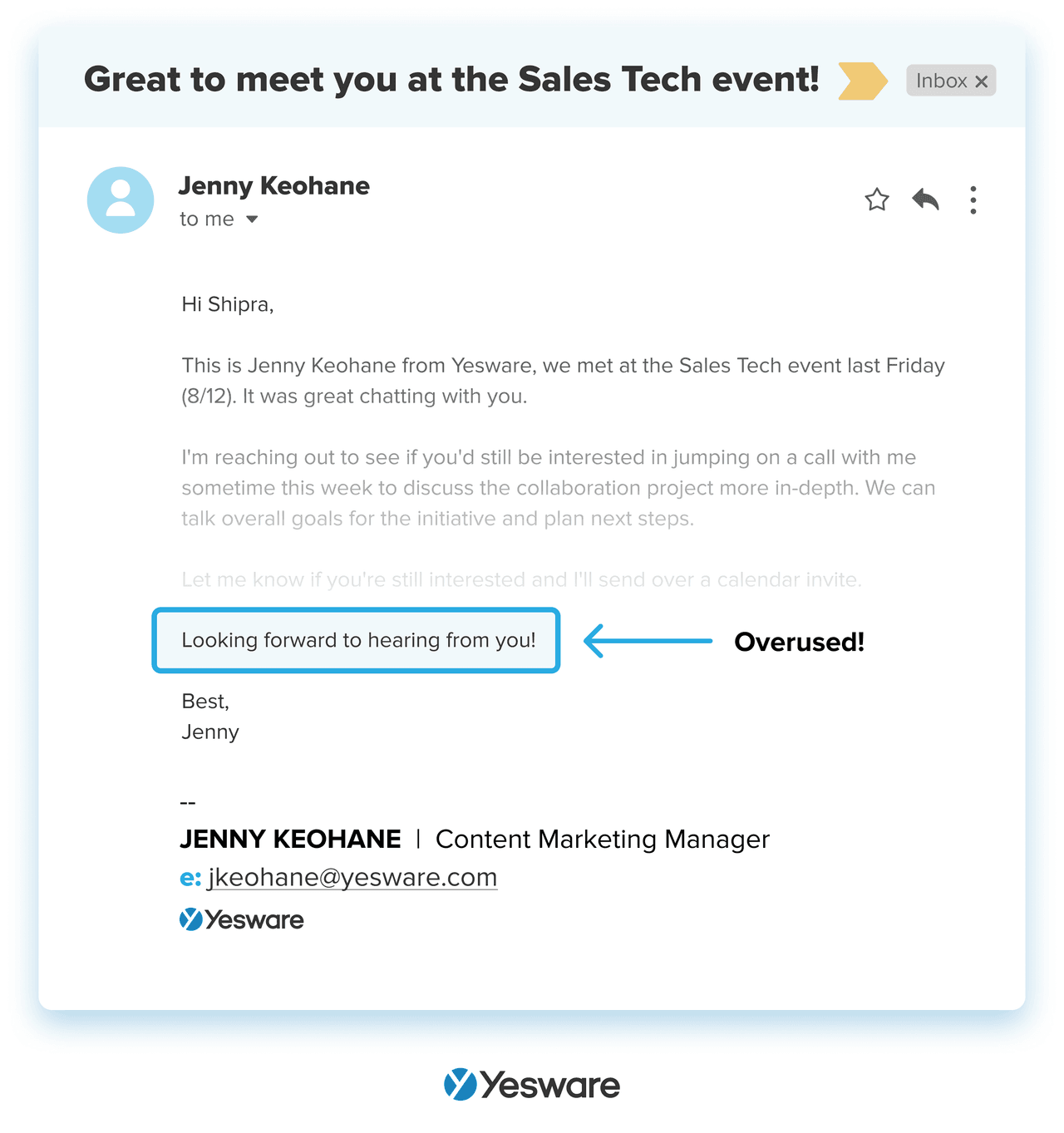 It’s widely used in both personal and business correspondence and indicates to the recipient that you’re hoping to hear back from them.
It’s widely used in both personal and business correspondence and indicates to the recipient that you’re hoping to hear back from them.
It’s okay to end your email with this phrase, but there are many alternative options that may suit your needs better.
Pros and Cons of Using “Looking Forward to Hearing From You”
If you’re hung up on how to sign off from an email, you might consider weighing the pros and cons of using the closer, “Looking forward to hearing from you.”
Pros
“I look forward to hearing from you” is far from the worst thing you could say at the end of an email message.
First, it’s friendly and upbeat. There’s nothing negative about this sign-off, and there’s no risk of your recipient mistaking your tone. This is a particularly solid closing line for sending emails to people with whom you’re already familiar.
“Looking forward to hearing from you” can also be effective because it’s very clear in the request: please respond to this email. This sign-off clearly implies that a reply is expected, which can prompt the recipient to do so sooner rather than later.
Cons
On the other hand, there are also some definite cons to using the phrase.
The first reason that “Looking forward to hearing from you” could be problematic is that it’s overused. Everyone has used it at some point in their email-writing life, and many people fall back on it subconsciously in many emails they send.
Because of how common it is, the phrase has a tendency to be overlooked or ignored. The words almost seem like they blend into the page. 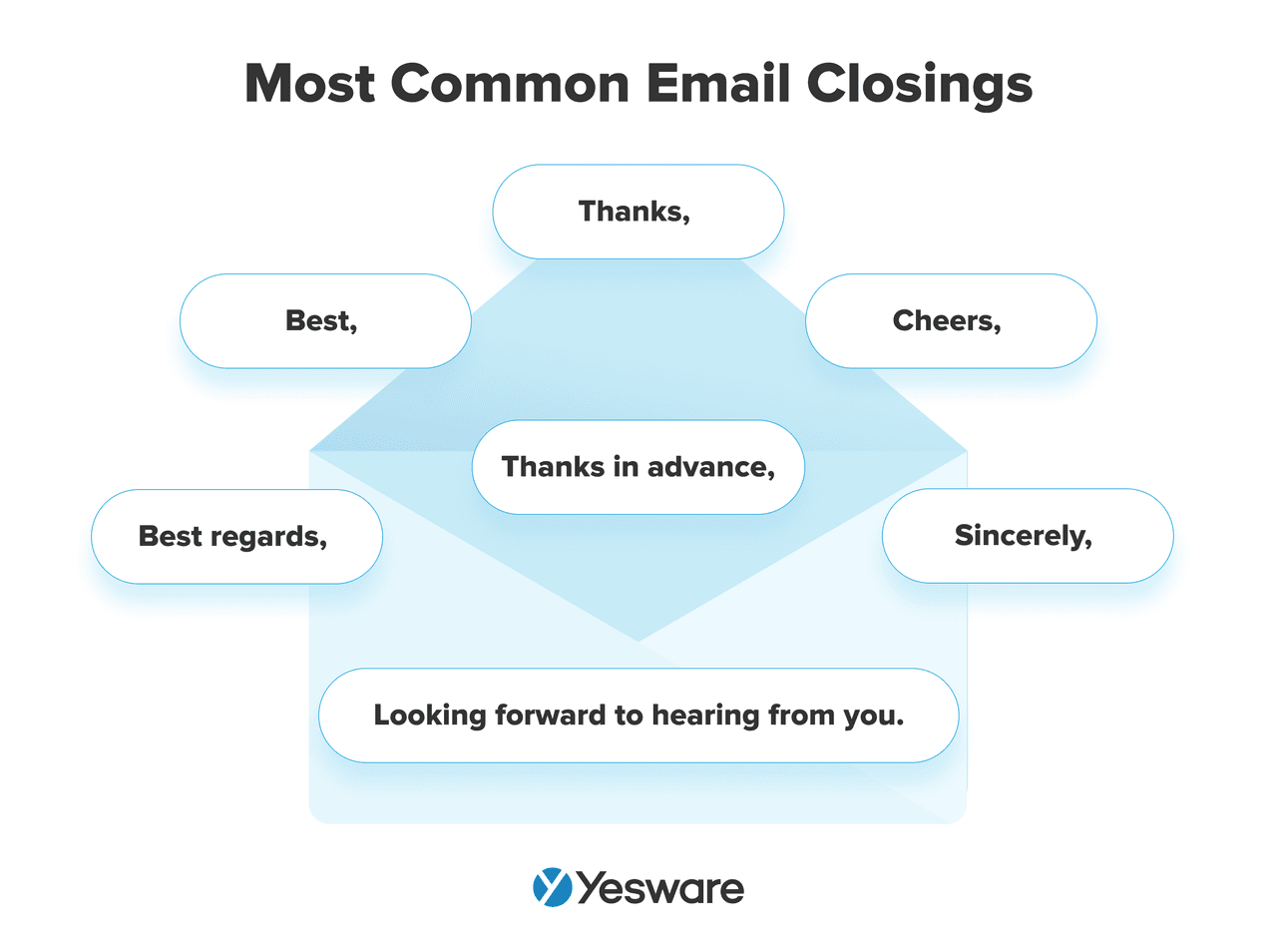 If you really need a response from the recipient, you’ll want to sign off with something that’s more than just placeholder text.
If you really need a response from the recipient, you’ll want to sign off with something that’s more than just placeholder text.
The other drawback to saying “I look forward to hearing from you” is that it puts you in a passive, rather than a proactive position. Once you use that line, it becomes a waiting game. The sender is forced to sit back and hope that the recipient will heed the sign-off and send their response.
20 Alternatives to Say “Looking Forward to Hearing From You”
Here are 20 alternatives you can use when you don’t want to write “Looking forward to hearing from you.”
1. Call to action
Although “Looking forward to hearing from you” does imply that you’d like a response, it doesn’t explicitly state so.
If a reply to your email is non-negotiable, you may want to opt for a stronger call to action. Tell them directly what you want them to do.
“I plan to send the final quote by Thursday. Can you please provide feedback by Friday at 5:00pm?”
“Let’s meet for lunch next week. Does Tuesday at noon work for you? Your pick.”
“Please share this with your buying team today.”
A call to action leaves nothing to guesswork or chance and clearly communicates the intended outcome.
2. “I’m eager to receive your feedback.”
This is a great sign-off for instances when you’re really hoping for a response, but don’t want to seem too pushy.
The lack of a formal deadline helps this feel a bit more relaxed.
3. “I appreciate your quick response.”
The word “quick” in this closing line helps the recipient understand the urgency, but it’s still relatively casual.
Ideally, the recipient will read this line and hit “Reply” right away.
4. “Always happy to hear from you.”
This final line is informal and friendly and is a great option for when you don’t necessarily need a response. It’s a nice touch in the middle of an ongoing dialogue, especially when some time lapses between communications.
5. “Keep me informed.”
If you need to be in the loop about project status or potential changes, you can try signing off with something like “Keep me informed,” or “Keep me posted.”
You can easily adapt this to be more casual or more formal, depending on how insistent you need to be.
6. “I await your immediate response.”
If you’re looking for something that comes across as very firm and urgent, try this one. “I await your immediate response” can be effective even for recipients who have so far ignored your outreach. Just be careful — it can sometimes come across as angry.
7. “Write soon!”
On the other end of the spectrum, “Write soon!” is upbeat, cheery, and very casual. In fact, it’s probably too informal for most business cases.
8. “Can you help me find the answer here?”
Human beings are wired to want to help one another, so you might consider appealing to that innate desire in your sign-off.
Just make sure you’re using a line like this authentically, in a situation that actually requires some assistance from the recipient. They’ll see right through you if you ask for help with something that’s easily solved on your own.
9. “I saw X and thought of you. What are your thoughts?”
If your prospect has gone cold and you need an organic way back in, you can try grabbing their attention with a line like this. The X here could be professional or personal. Here are a couple of examples:
“I saw this article on LinkedIn the other day, and it reminded me of the work you all are doing in the manufacturing space. The part that stood out to me was [noteworthy point]. What are your thoughts?”
“I saw on the news this morning that Phoenix is experiencing record heat this week. Highs of 120°! Hope you’re staying cool out there!”
The more specific and personal the note, the more likely they’ll be to respond.
10. “It would really help me if you could reply by Wednesday.”
Here’s another “looking forward to hearing from you” alternative that appeals to the instinct to help. In fact, this one uses the word “help” directly in the sign-off phrase.
It also includes a date, which draws the recipient’s attention and helps give some urgency to the request.
11. “If you’re too busy to handle this request, is there someone else I can reach out to?”
This line is pretty direct, and can honestly come across as a bit confrontational. Asking someone if they’re too busy could be interpreted as you calling them out for blowing you off.
Use this line sparingly and only in specific circumstances, like when the deal is about to go through and you’re willing to go around them if necessary to keep it on track.
12. “If I don’t hear from you by [date], I’ll assume we’re good to move forward on this.”
Here’s a line that doesn’t require a response, but leaves the door open for one if the recipient deems it necessary.
This is good for situations in which you and the recipient are generally on the same page.
13. “I appreciate your quick response.”
This is a friendly, gentle way to insist on a response. Offering appreciation keeps it friendly, but the word “quick” is effective in communicating the urgency needed. You could also include a sentence about why a quick response is necessary.
14. “I haven’t heard from you regarding [topic]. When this happens, it usually means [conclusion]. Is that correct?”
This is another alternative to use only in a last-resort scenario. It spells out the present conditions and helps outline the implications of the circumstances as they stand now.
“I haven’t heard from you about the proposal I sent over last week. When this happens, it usually means the prospect is no longer interested in moving forward. Is that correct?”
“I haven’t heard from you about what features you’d like to upgrade in your offer. When this happens, it usually means the prospect is overwhelmed by the choices. Is that correct? I’m happy to give you a call to go through them.”
If you’ve gone a while without hearing from them, you have a fifty-fifty chance of getting a response with a question like this. Still, it’s worth a try to clear the air and get on the same page to keep things moving forward.
15. “Let me know if you’re interested so I can get started immediately.”
The word “immediately” can definitely be a trigger for some recipients and gets them motivated for action. Even if they aren’t interested in what you’re offering, the urgency of the request will usually spur them into a quick response either way.
16. “Do you have any questions?”
This is a great way to sign off emails early in the sales process. It helps open the lines of communication between buyer and seller, and makes the sales process feel more supportive and organic (rather than transactional).
17. “I can’t wait to hear what you think.”
“I can’t wait to hear what you think” is a friendly and exciting way to indicate to the recipient that you value their thoughts and that you’d love a response.
If you want to add a bit more urgency, you can include a date.
18. “What are your thoughts?”
This is a low-key, no-pressure way to get the recipient to respond. It speaks to the human desire to answer questions. Although the tone of this line is pretty casual, it’s actually a very direct way to ask for feedback.
19. “Let me know how this all sounds/if this all sounds good to you.”
Here’s another low-stakes way to leverage a response. This kind of sign-off indicates that you want to get on the same page as the recipient and that they can help you achieve that by confirming the status of things on their end.
20. “Your prompt response would be appreciated.”
This is a bit more formal, and a very congenial way to request a timely response. It’s hard to say no to a request this polite! It can be used at any point during the sales process.
Tip: Grab more “looking forward to hearing from you” alternatives below (along with proven email templates that generate replies).
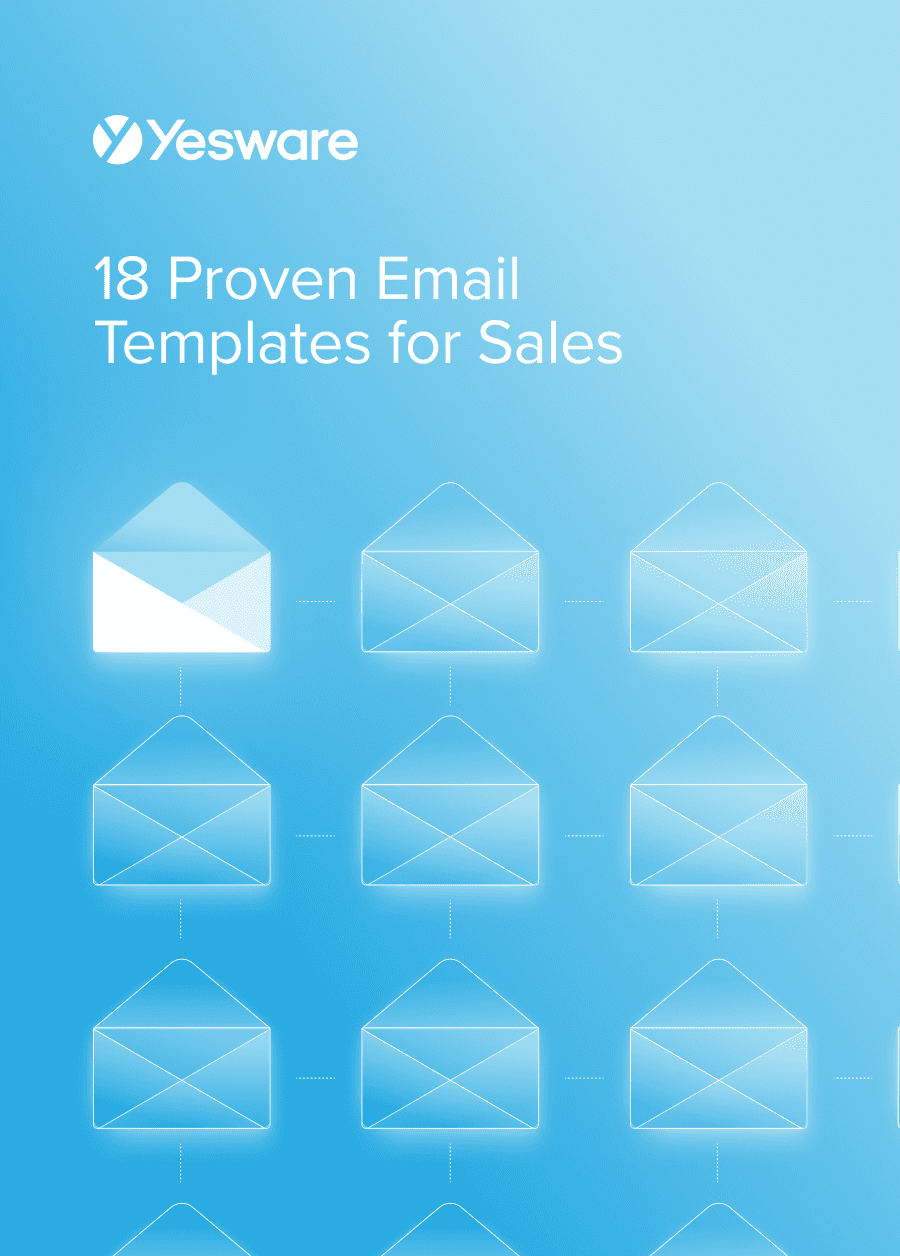 18 Proven Email Templates for SalesWinning email templates for cold outreach, follow-ups, and nurturing relationships – backed by data and real-world examples.
18 Proven Email Templates for SalesWinning email templates for cold outreach, follow-ups, and nurturing relationships – backed by data and real-world examples.
Email Sign-Off Best Practices
Here are three best practices for signing off your email messages.
Perform A/B Testing
Ultimately, the best email sign-off will depend on the preferences of your market and your specific buyer personas. A/B testing can help you determine the exact tone, verbiage, and length that are most likely to initiate a response.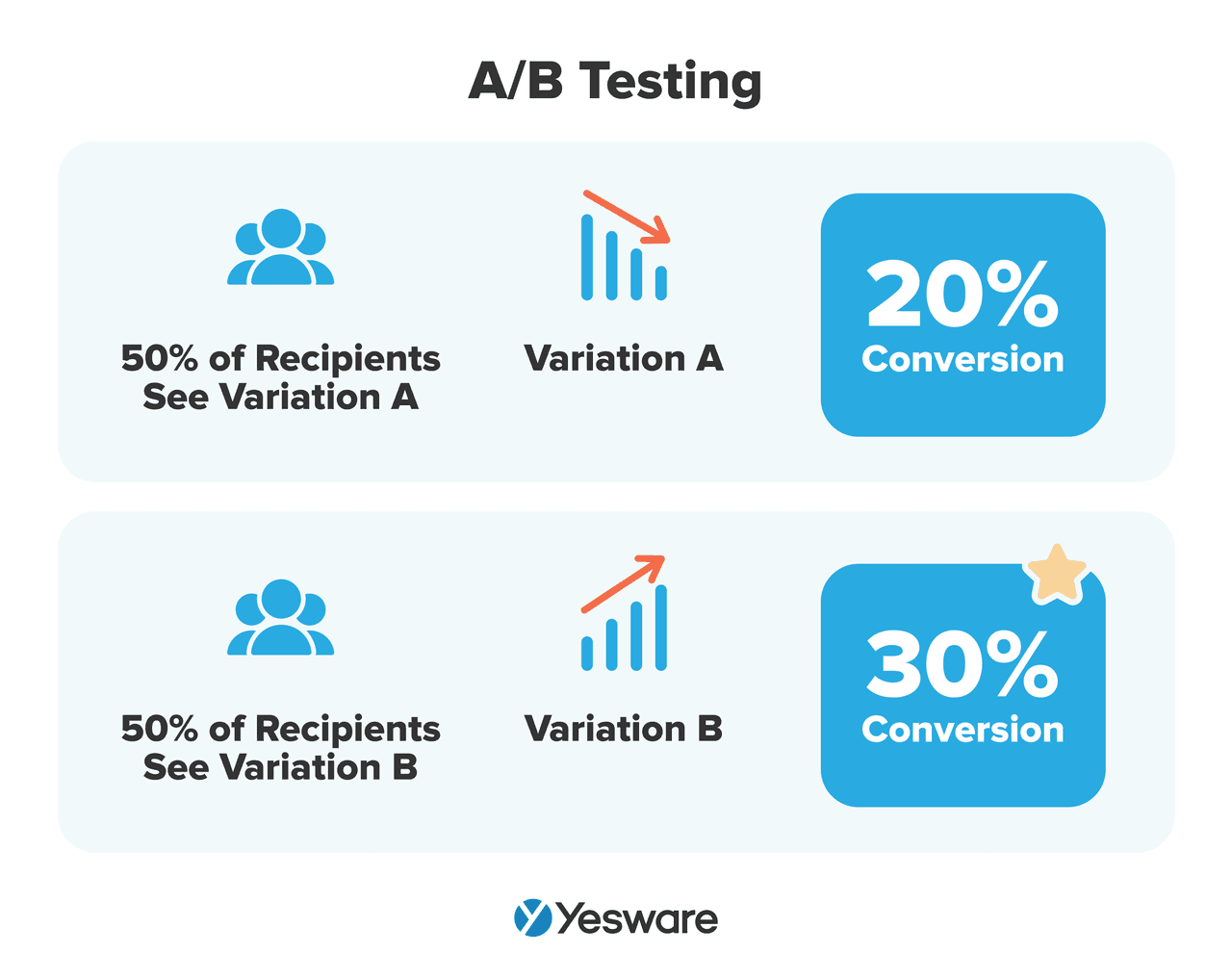 You can do as many of these A/B tests as you need, as it’s likely that your different customer segments will require different email sign-offs.
You can do as many of these A/B tests as you need, as it’s likely that your different customer segments will require different email sign-offs.
Be Consistent
Consistency is key. Each of the 20 examples we outlined in this article has its own distinct tone. The tone of your email sign-off should match the tone of your overall email.
If the rest of the message is formal and direct, don’t sign off with something laid-back and non-committal.
It’s the seller’s discretion as to what tone to take, as long as it’s consistent throughout the email.
Include a Link to Your Calendar
If you’re signing off with a meeting request or other indication you’d like to schedule something, you can make it easy for your recipient by including a link to your calendar directly within the email.
Tip: Yesware’s Meeting Scheduler auto-populates your calendar and lets your recipient choose a mutually-available time that works best for them – all within an easily insertable link.
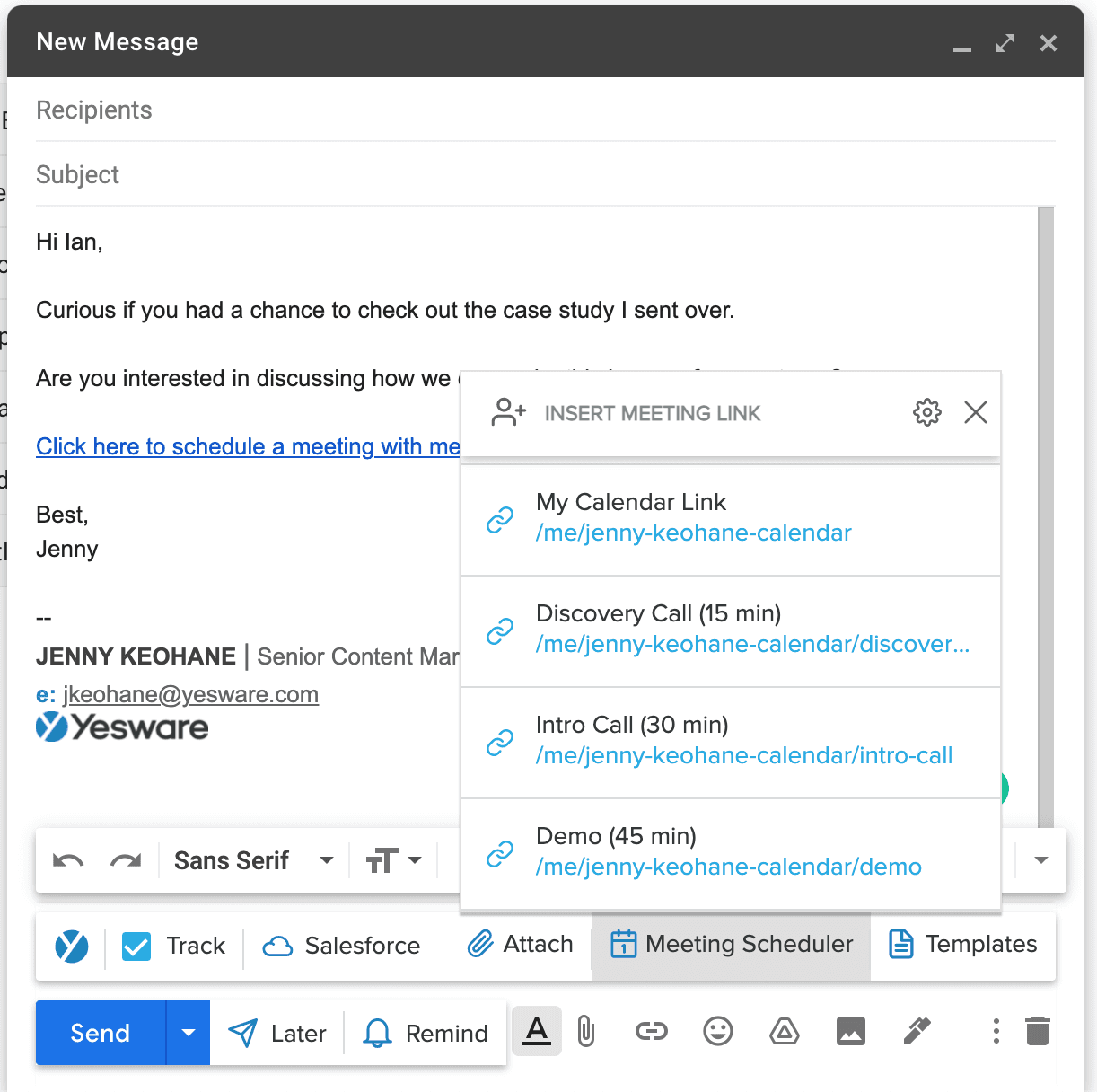
Do you use the phrase “Looking forward to hearing from you?” What is your reply rate? How can you change it up the next time you write an email?
More alternative guides:
- 15 Alternatives to Say “I Hope This Email Finds You Well”
- 20 Alternatives to Say “Just Checking In”
- 15 Alternatives to Say “Thank You for Your Understanding”
- 11 Alternatives to Say “As Per My Last Email”
Get sales tips and strategies delivered straight to your inbox.
Yesware will help you generate more sales right from your inbox. Try our Outlook add-on or Gmail Chrome extension for free, forever!
Related Articles
Jenny Keohane
Jenny Keohane
Jenny Keohane
Sales, deal management, and communication tips for your inbox

